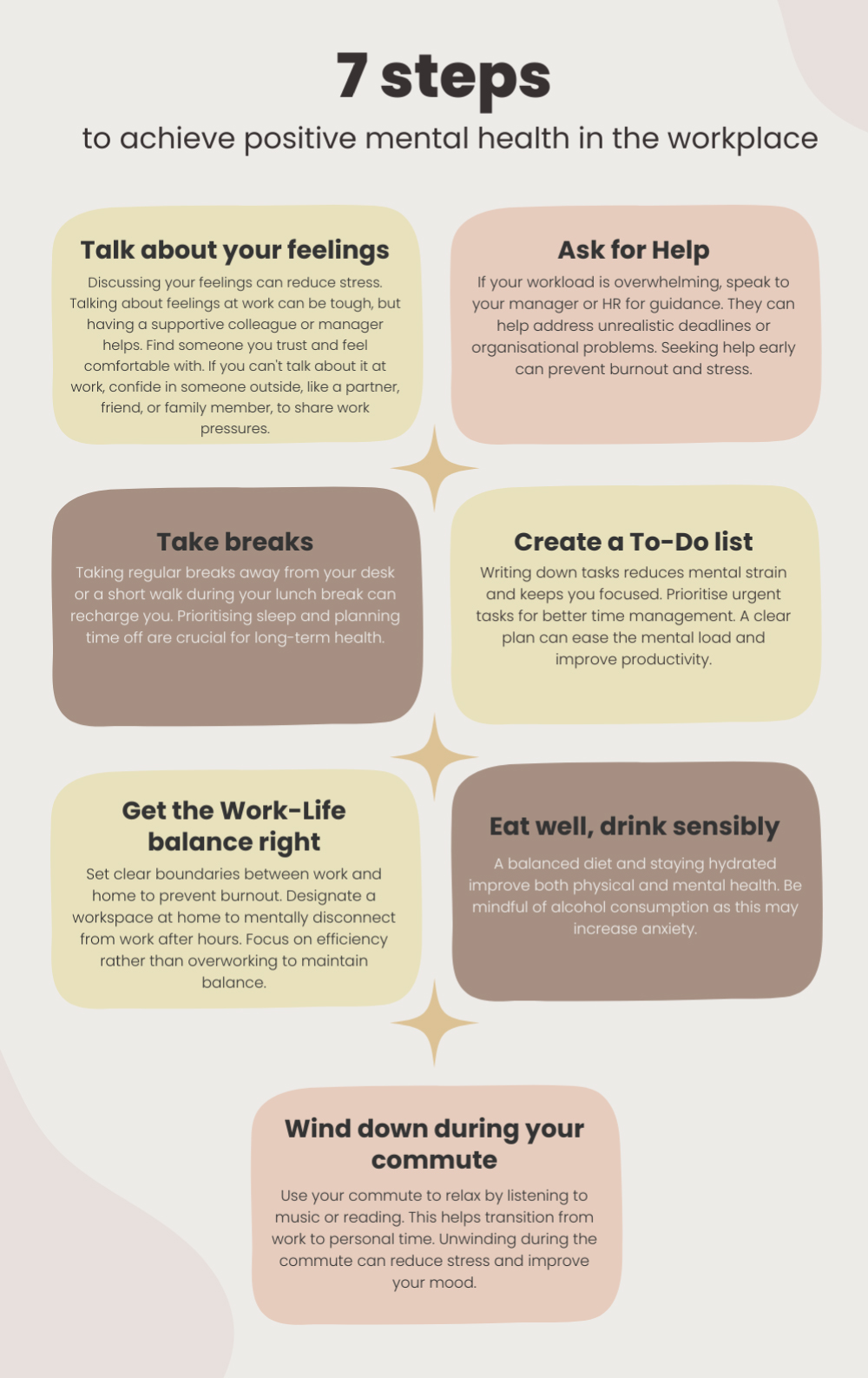World Mental Health Day: 10th October 2024
“Workplace Mental Health”
World Mental Health Day, celebrated annually on October 10th, raises global awareness of mental health issues and encourages action to address these challenges. Each year, the World Federation for Mental Health selects an official theme, and for 2024, the theme is “workplace mental health – it’s time to prioritise mental health in the workplace.” This theme highlights the importance of supporting employee wellbeing by reducing stress, fostering support, and promoting a healthy work-life balance to benefit individuals, organisations, and our communities.
This article will specifically focus on mental health in the workplace, discussing the significance of open conversations about mental health, common workplace mental health challenges, and practical steps individuals can take for better wellbeing.
The Importance of Mental Health in the Workplace
With 60% of the global population in the workforce, urgent action is needed to create work environments that protect and support mental health. The connection between mental health and employment is significant. Even individuals with good mental health can face challenges in a workplace that is unsupportive or unhealthy. In 2023, approximately 15% of working-age adults experienced mental health disorders, according to the World Health Organisation (WHO). Reports also indicate depression and anxiety lead to the loss of 12 billion workdays annually, emphasising the importance of effective mental health coping strategies. The WHO states: “there is no health without mental health,” emphasising the need for supportive workplace cultures. Additionally, Office for National Statistics (ONS) reports that mental health issues were the 5th most common reason for sickness absence in 2022, highlighting the importance of addressing mental health in the workplace for the wellbeing of all our colleagues.
Prioritising mental health fosters a productive culture. When employers actively address well-being, they experience reduced stress, lower absenteeism, and increased engagement. Policies like flexible work hours, access to mental health resources, and promoting open conversations can cultivate a culture of care that boosts morale, enhances performance and promotes employee wellbeing.
Common Mental Health Challenges in the Workplace
Identifying common mental health challenges in the workplace is essential for early support and intervention. Issues such as burnout, which involves ongoing physical and emotional exhaustion, and stress or anxiety, often caused by heavy workloads or conflicts, are common. These problems can be worse in remote or hybrid work environments, where employees may feel isolated. These factors can seriously affect performance, creativity, and teamwork, emphasising the importance of creating a mentally healthy workplace.
How can I look after my mental health at work?
Having identified the most common mental health challenges in the workplace, it’s essential to explore practical steps to overcome them. Here are seven effective ways to improve your mental health at work:

For more information on how to get involved in World Mental Health Day 2024 and to explore additional reading and resources, please see the links below.
Further Reading and Resources
- World Mental Health Day 2024 | How to Get Involved!
- What is mental health and how does it affect people at work?
- How can I support colleagues with their mental health?
- Employer checklist for creating mentally healthier workplaces
England, Wales & Scotland: Samaritans: Call 116 123 (24/7, free). Mind: Visit Mind’s Workplace Resources for resources tailored to employers and employees to promote mental health in the workplace.
Spain: Samaritans Spain: Call 900 525 100 for support.
Seattle, Washington: Crisis Connections: Call 206-461-3222. Services: Provides 24/7 crisis intervention, emotional support, and resources for individuals in crisis.
Tokyo, Japan: Tokyo English Lifeline (TELL): Call 03-5774-0992 for English-speaking support regarding workplace mental health issues. Mental Health Centre Tokyo: Call 03-5286-9090 for resources and support focused on workplace mental health.

International Equal Pay Day
Equal pay for work of an equal nature and value is a fundamental right that is still no more than a dream for many women across the world.